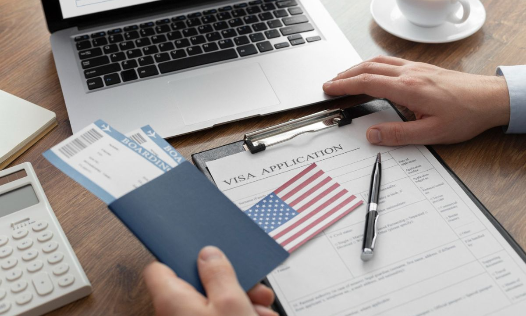Payment is being processed. Please do not refresh or close this page until your payment is complete.
 Book an Appointment
Book an Appointment

Starting April 2025, U.S. visa applicants, including students, skilled workers, and tourists face enhanced digital scrutiny. The government now reviews public social media posts for extremist content or affiliations. Learn who’s affected and how to protect your visa status under the new immigration rules.
If you’re planning to study, work, or travel to the United States, your online presence is now under the microscope. As of April 2025, U.S. immigration authorities have rolled out sweeping new policies that make social media screening a formal part of the visa process.
From students to skilled workers and even humanitarian travellers, your public posts, likes, shares, comments, and group affiliations could make or break your visa application.
Who’s Affected by the New Social Media Policy?
1. International Students (F-1, J-1, M Visas)
International students are among the first groups impacted. U.S. universities like Georgetown, the University of Texas, and Stony Brook have issued alerts warning students that their digital history over the past five years may now be reviewed.
Content deemed “antisemitic,” “extremist,” or associated with flagged groups can lead to delays or outright rejections of student visa applications or renewals.
2. Skilled Workers & OPT/STEM OPT Applicants (Including H-1B)
Are you planning to apply for a work permit under H-1B, OPT, or STEM OPT? Immigration officials are now authorised to assess your social media footprint for affiliations with ideologies flagged as hostile or dangerous to U.S. national security.
This can impact both new visa applicants and those seeking renewals in 2025 and beyond.
3. Tourists & Visitors from Conflict Zones
If you’ve travelled to countries like Gaza, Iran, Syria, or Yemen since 2007, even for humanitarian reasons, you may be flagged for a detailed social media review under a new Security Advisory Opinion (SAO) protocol.
This added layer of scrutiny applies even to NGO workers, journalists, and volunteers.
4. Academic Researchers and Visiting Scholars
Postdoctoral researchers and academics under exchange programs are also in the spotlight. Consulates now have the green light to screenshot and archive social media accounts during visa evaluations.
This directive could impact research fellows, visiting professors, and conference attendees.
5. Green Card & Immigration Applicants
Those applying for permanent residency (green cards) must now also meet digital behaviour standards. DHS and USCIS will examine public online activity for support or endorsement of “antisemitic terrorism” or organisations promoting violent action.
Your digital history could now directly influence your path to U.S. residency or citizenship.
What Immigration Officers Are Monitoring on Social Media
• Likes, comments, or reposts related to terrorist organisations (e.g., Hamas, Hezbollah)
• Participation in hashtags or trends opposing U.S. interests
• Membership in online groups flagged for antisemitic or extremist content
• Public posts supporting violent ideologies or radical views
🛑 Note: You won’t be asked for passwords, but anything public is fair game.
AI-Powered “Catch and Revoke” Program Now Active
In a major shift, the U.S. State Department has launched the “Catch and Revoke” initiative. Using AI tools, immigration officials can now cancel valid U.S. visas in real-time if social media activity is later flagged as supporting terrorism.
There are already cases where individuals were denied re-entry or deported based on posts made years earlier.
What You Should Do Now: Action Steps
• Audit Your Online Footprint: Review Facebook, X (Twitter), TikTok, Instagram, and LinkedIn for any posts or likes that might be interpreted as extreme or offensive.
• Remove Risky Content: Delete or hide politically radical, hateful, or controversial posts, even if they seem harmless to you.
• Disclose Accurately: Omitting your social media accounts or lying about activity could result in bans.
• Consult Experts: Reach out to your university’s international student office or an immigration attorney for tailored advice.
Additional U.S. Immigration Scrutiny You Should Know About
This isn’t the only change in 2025. The United States has increased overall immigration checks, especially for applicants from countries under travel restrictions or sanctions.
Other Notable Trends:
• Increased H-1B visa audits and stricter work location verification
• Longer wait times for B1/B2 tourist visas from high-volume countries
• More emphasis on in-person interviews, especially for green card and asylum applicants
• Tighter vetting for asylum seekers from regions with terrorism-related activity
For travellers from conflict zones or politically unstable regions, even transit visa applications are now facing additional delays and interviews.
Final Thoughts
As global mobility tightens, digital footprints are no longer private opinions, they are immigration records in the eyes of U.S. authorities. Whether you’re a student, professional, tourist, or researcher, it’s time to clean up your social media and stay informed on evolving immigration policies.
Source: https://travelobiz.com/us-visa-denied-social-media-2025-rules-travelers/